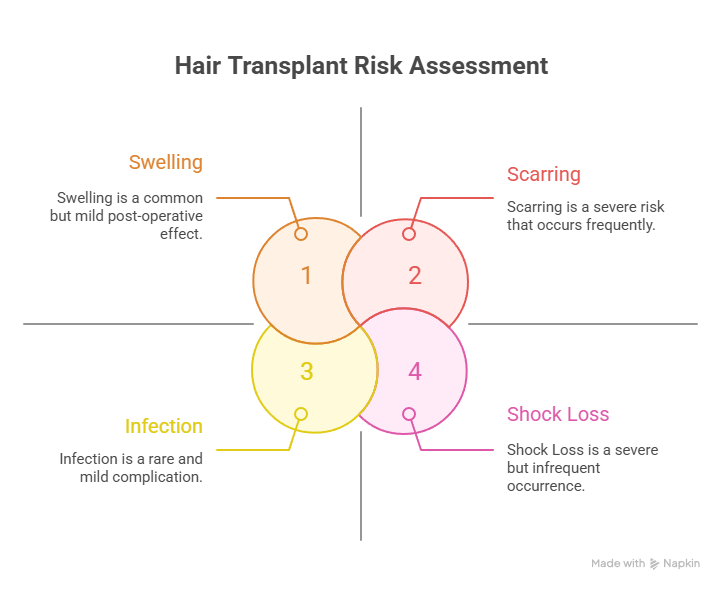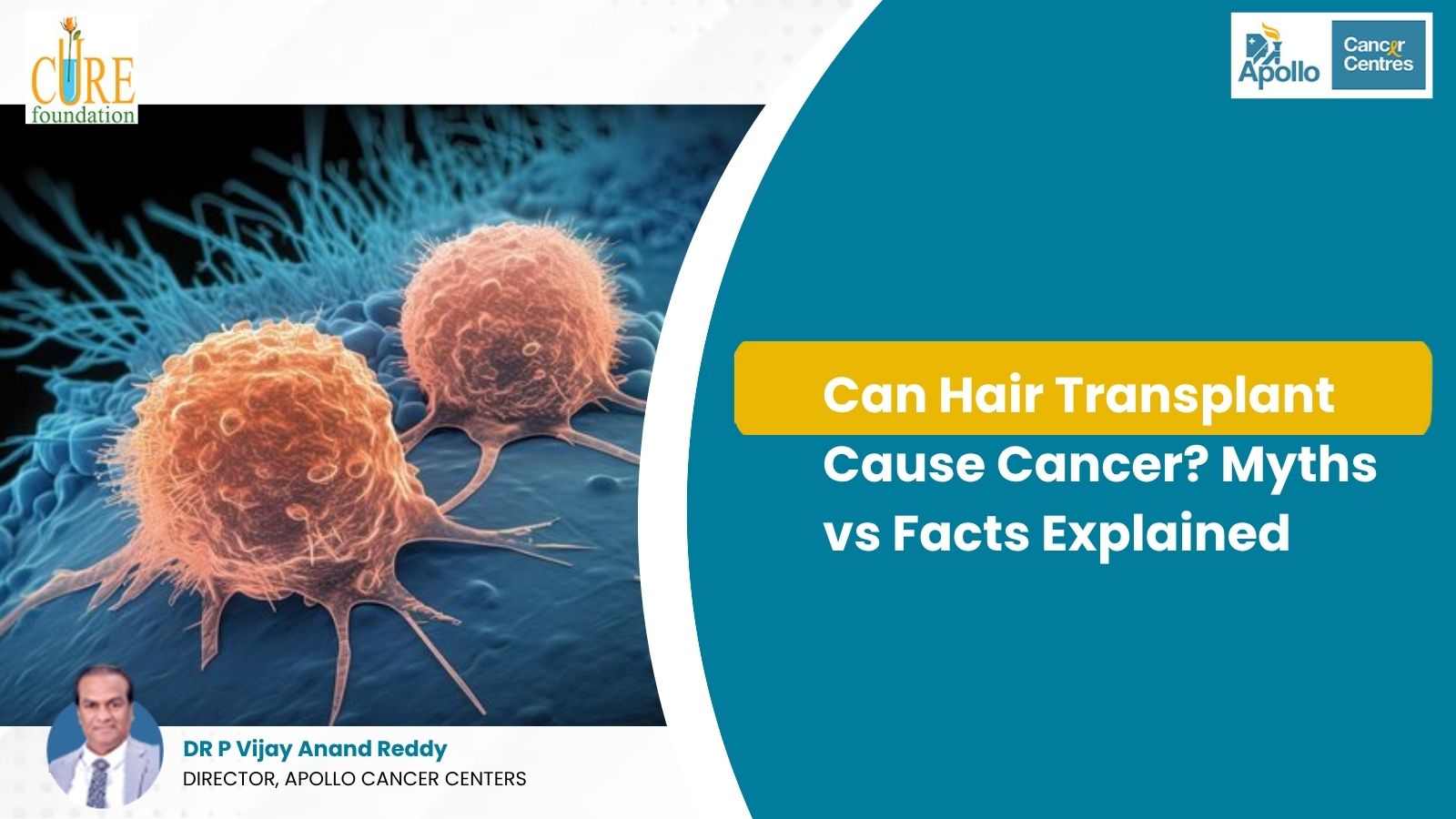Concerns about our health are something we all share, and when considering any medical procedure, it’s completely natural to have a lot of questions. One particular question that often comes up, especially among those looking into aesthetic options like hair transplantation, is: Can hair transplant cause cancer? This concern, while understandable because we all worry about our health, often stems from myths circulating rather than actual medical facts. My goal today is to tackle this common worry head-on. I want to clarify the misunderstandings and present the straightforward facts so you have a clear and reliable understanding from a medical perspective.
Deciding to get a hair transplant is a big step for many people. It can boost your confidence and help with the emotional impact of hair loss. But just like with any medical procedure, it’s normal to have questions. Sometimes, those questions can even lead to anxieties fueled by popular myths. As a medical professional, I, Dr. Vijay Anand Reddy, believe it’s so important to give you accurate information. That way, you can make informed decisions without any unnecessary worrying.
Understanding Hair Transplants: A Quick Chat
Before we dive into that crucial question – “Can hair transplant cause cancer?” – let’s just quickly go over what a hair transplant involves. Basically, it’s a surgical procedure where we move healthy hair follicles from one part of your body (usually the back or sides of your head, which we call the “donor area”) to an area where your hair is thinning or missing (the “recipient area”). These transplanted follicles are naturally resistant to balding, so they continue to grow just like normal hair in their new spot.
There are generally two main ways we do this:
- Follicular Unit Transplantation (FUT): This is where we take a small strip of skin that has hair follicles from the donor area. Then, we carefully divide that strip into individual hair units to transplant them.
- Follicular Unit Extraction (FUE): With this method, we extract individual hair follicles one by one directly from the scalp using a special little tool.
Both procedures are done using local anesthesia. That means you’re awake, but the area we’re working on is completely numb, so you won’t feel anything. Overall, these procedures are considered very safe and usually work well, especially when performed by an experienced team.
Let’s Talk About the Big Question: Can Hair Transplant Cause Cancer?
Let’s get right to it: There is absolutely no scientific evidence – none at all – that suggests hair transplant procedures cause cancer. This is a myth, plain and simple, and it’s one we need to put to rest. The procedure itself is purely about looks; we’re just moving your existing, healthy hair follicles from one place to another. We’re not putting any cancer-causing substances into your body, and we’re not changing your DNA or cell structure in a way that could lead to cancer.
Just think about it: Hair transplants have been performed all over the world for decades, on millions of people. If there were even the tiniest connection between hair transplants and cancer, we would have seen a clear pattern emerge by now. But leading medical and dermatological groups globally, after tons of research and watching countless cases, have never found any such link.
Why Do These Kinds of Myths Pop Up?
It’s pretty common for myths to spread around medical procedures. This often happens because of a mix of things:
- Not Enough Information: When people don’t fully understand a procedure, they might fill in the blanks with guesses or stories they’ve heard.
- Fear of the Unknown: Any surgery can make us feel anxious. Sometimes, those unfounded fears can show up as health worries, like “Can hair transplant cause cancer?”
- Misinterpreting Things: Sometimes, unrelated events or just coincidences get mistakenly linked together, creating a false story.
- Sensationalism: The internet is amazing for getting information, but it can also be a place where exaggerated or misleading stories get a lot of attention.
It’s really important to get your medical information from trustworthy sources, and that’s exactly what I aim to provide here.
The Science Explains Why Hair Transplants Don’t Lead to Cancer
Let’s dig a little deeper into the biology of why the question of “can hair transplant cause cancer?” just doesn’t hold up:
- What the Procedure Is: A hair transplant is a very superficial procedure. We’re simply moving tissues around; we’re not introducing anything foreign or any substances that could make your cells change. The hair follicles we transplant are your cells, just moved to a different spot.
- No Cell Changes: Cancer happens when abnormal cells grow out of control, usually because of genetic changes or exposure to things that cause cancer. Hair transplant procedures don’t involve anything that would cause these kinds of cell changes. We’re not messing with your genes or bringing in agents known to cause cancer.
- Local Anesthesia is Safe: The anesthesia we use is local, meaning it only numbs the specific area of your scalp. These anesthetics are very well-studied and haven’t been linked to cancer development.
- Clean and Sterile Environment: We always perform these procedures in sterile conditions. This prevents infections and further minimizes any risks.
Your body’s natural healing process after a hair transplant is simply about repairing tissue and letting the new follicles settle in and grow. It’s not a process that would ever kick off cancerous growth.
What Are the Real Risks of Hair Transplants?

While the question “Can hair transplant cause cancer?” has no basis, it’s important to know about the actual potential risks, even if they’re usually small. These are generally mild and don’t last long:
- Swelling: You might see some swelling, especially around your forehead and eyes, but this usually goes down in a few days.
- Bruising: There might be some minor bruising in the areas we’ve worked on.
- Numbness: It’s common to feel temporary numbness in the treated areas.
- Itching: Your scalp might feel a bit itchy while it’s healing.
- Infection: This is rare, but it can happen. We usually manage it easily with antibiotics.
- Folliculitis: This is when the hair follicles get inflamed or infected, and it can be treated.
- Scarring: With FUE, there’s usually very minimal scarring in the donor area. With FUT (the strip method), there will be a linear scar, but it’s often well-hidden.
- Shock Loss: Sometimes, existing hair around the transplanted area might temporarily shed. But don’t worry, it usually grows back!
These are all common things we consider with any surgery, and experienced surgeons know exactly how to manage them. None of these has anything to do with cancer.
Focus on True Cancer Prevention
Instead of worrying about whether can hair transplant cause cancer, it’s much more beneficial to focus on proven ways to prevent cancer – things that genuinely make a difference to your health. As a medical professional, I always tell my patients to:
- Live a Healthy Life: Eating a balanced diet full of fruits, veggies, and whole grains, combined with regular exercise, can really lower your cancer risk.
- Say No to Tobacco and Limit Alcohol: Smoking is a major cause of many different cancers, and drinking too much alcohol is also a known risk factor.
- Protect Your Skin from the Sun: Too much exposure to UV rays increases your risk of skin cancer. Always use sunscreen, wear protective clothing, and find shade when the sun is strong.
- Get Regular Check-ups: Catching cancer early is key. Regular screenings and check-ups can help find cancer when it’s most treatable.
- Know Your Family History: Understanding if cancer runs in your family can help your doctor tailor screening plans just for you.
- Manage Stress: Long-term stress can affect your immune system, which plays a role in fighting off abnormal cells.
These are the truly effective steps you can take to lower your cancer risk, not concerns about getting a hair transplant.
Choosing the Right Doctor: Your Peace of Mind
The safety and success of your hair transplant largely depend on the skill of your surgeon and the quality of the clinic. When you’re thinking about a hair transplant, always make sure to look for:
- Board Certification: Make sure your surgeon is board-certified in a relevant specialty. This means they’ve had extensive training and know their stuff.
- Lots of Experience: Choose a surgeon who has performed many hair transplant procedures.
- Accredited Facility: The clinic should follow strict rules for hygiene and safety.
- Clear Consultations: A good surgeon will patiently explain the entire procedure, what you can expect, any potential risks, and the likely results. They should also be happy to answer all your questions, including if you ask, “Can hair transplant cause cancer?”
- Patient Reviews: While every experience is unique, seeing a lot of positive feedback from previous patients is a good sign.
If you’re in Hyderabad, choosing a reputable clinic with experienced surgeons is incredibly important. And remember, for any complex medical decisions or general health concerns, especially those related to oncology, it’s always wise to talk to a specialized medical practitioner, like a Cancer Specialist in Hyderabad. It’s all about taking a holistic approach to your well-being.
Let’s Clear Up Other Hair Transplant Myths
Beyond “can hair transplant cause cancer,” let’s quickly clarify a few other common ideas that aren’t quite right:
- Myth: Hair transplants look fake.
- Fact: With today’s advanced techniques and skilled surgeons, transplanted hair blends in beautifully with your existing hair, looking incredibly natural. The secret is careful planning of your hairline and hair density.
- Myth: Hair transplants are only for men.
- Fact: While it’s very common for men with pattern baldness, many women also get fantastic results from hair transplants, especially for thinning hair or receding hairlines.
- Myth: You’ll run out of donor hair.
- Fact: The donor area (usually the back and sides of your head) is chosen because those follicles are strong and don’t typically fall out. A good surgeon will carefully assess your donor supply to make sure there’s enough hair to transplant without taking too much.
- Myth: Hair transplants hurt terribly.
- Fact: The procedure is done under local anesthesia, so you won’t feel pain during the surgery itself. You might have some mild discomfort or soreness during recovery, but that’s easily managed with pain medication.
- Myth: Transplanted hair just falls out.
- Fact: Yes, the transplanted hair shafts will shed within a few weeks – this is normal and part of the process! But the hair follicles themselves are permanent. They’ll start growing new, healthy hair within a few months, and that hair will continue to grow for a lifetime.
Conclusion
I truly hope this detailed explanation has eased your mind and clarified things about the safety of hair transplant procedures. The idea that “can hair transplant cause cancer” is a persistent myth, and it’s so important to understand that there’s no scientific evidence to back it up. My commitment, as Dr. Vijay Anand Reddy, and that of dedicated medical professionals everywhere, is to provide the very best care. This means ensuring both the aesthetic success of your procedure and, more importantly, your absolute safety.If you’re considering a hair transplant, I strongly encourage you to seek out qualified professionals who genuinely care about educating their patients and prioritizing safety.
For any other health concerns, especially those related to cancer, please always consult a specialized medical expert, such as a Cancer Specialist in Hyderabad. Your health is the most important thing, and making informed decisions is always the best way forward.

